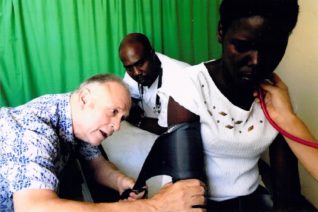Haiti
Medical Care, PediatricsWe’re working our way out of a job.
I went to Haiti the week before Thanksgiving with another doctor, five nurses, an educator and a priest to a clinic that’s been in operation over 20 years. There was lots wrong with the medical care the rest of the team and I were able to provide. We had virtually no Lab facilities, no X-rays and not enough medications to treat most of the infections and other diseases we saw. I’ll do better next time.
I saw horrible bacterial and fungal skin and scalp infections. I doubt that the ten days of antibiotics I was able to prescribe did much. We also found out at the end of the trip that a fair amount of the medications and supplies we brought were stolen and that our depressed Haitian pharmacist was freely substituting medications they had for the ones we prescribed without telling us. Thankfully, the clinic has full time Haitian doctors, Haitian nurses, and Haitian community health workers who will continue to do their excellent work with the resources they have. The 1,000 500mg Amoxicillin capsules, 10 cans of baby formula, and Pediasure I stole from our office wouldn’t have much of an impact, but better than nothing. A friend of mine referred to it as spitting in the ocean and I almost punched him.
Better than nothing was our mantra and the mantra of two earlier trips I took to Honduras. Honduras is a country club compared to Haiti, a lot of murder, guns and drug trafficking, but cleaner and with better roads. The Haitians were incredibly grateful for our efforts including my efforts to speak Creole which is a blend of French and the African languages slaves brought with them. Bon bagay, which means “good thing” was my best phrase. ‘Respire’ means take a breath. I never thought my high school French would come in handy. I now harbor delusions that with practice I’ll be able to speak Creole.
Among the many problems faced by Haiti are that they’re the only country around that speaks Creole and French and they’re the only country founded by a successful slave revolution against white colonialism. Honduras is poor and has other problems but Haiti is far and away the poorest country in this hemisphere. I saw orange haired, big bellied children with skeletal arms and legs who were quite literally starving to death, a set of 17month old girl twins one of whom might survive and another too weak to eat or drink. I saw mothers too thin and sick to make breast milk. Haitians loved the way I could get four month olds to laugh and chat. When I go back I’m bringing books, one of the things, along with toys, they didn’t have.
My friends give me credit for being a really good guy to go on medical missions but the truth is it does at least as much or more for me than the people I try to help. I was trained how to take direct care of patients and there are fewer and fewer opportunities to do that and more and more frustrations back here at home. I went to get away. I had great teachers who are now no doubt rolling over in their graves looking down on how thoroughly the business of medical care has displaced the mission of taking care of the sick.
Our increasingly high cost low value medical care works out well for insurers. You might assume because they are the ones paying the increasingly outrageous bills that they would want to be paying out less and getting higher quality but because they aren’t the ones consuming the product being sold and they get to set premiums higher and higher and cover less and less, you would be wrong.
There is not a single innovation by the healthcare insurance industry that hasn’t increased costs and lowered accessibility and cost by over insuring and over treating the relatively well, well off and well insured while denying care to the sick, relatively poor and less well insured. It started with denying coverage for “preexisting conditions” an utterly arbitrary, scientifically indefensible distinction. High copayment high deductible options and the rest of managed care do exactly the same thing.
The average American household is paying in ~$20,000 for less than $2,000 worth of care that used to cost ~$200, the average cost of medical care to the average American household in 1967. Dollars are different than they used to be but new cars don’t cost $20,000,000. If you had medical insurance, it paid your medical bills. If not it was usually affordable out of pocket or routinely written off by community hospitals and community practitioners. The science and technology is better now but most of those advances could have and would have made care more effective and less expensive if it weren’t for how we pay for care. The discovery of Penicillin and insulin and the elimination of Polio were not mixed blessings. Insurance schemes and science for hire have slowed meaningful medical progress to a crawl. The hospitals are taller, have more glass and faster elevators.
In Haiti there were no copayments deductibles prior authorizations or clunky Electronic Medical Record systems. The idea that a pharmaceutical company or insurer can somehow own and control access to the fruits of science and scientific medical care is offensive on the face of it and bad for everyone.
Depressed doctors don’t take very good care of people. They’re too busy being depressed. While the medical profession has a long history of alcoholics, drug addicts and otherwise less than well practitioners, there have never been so many depressed ones. Along with educational debt and the now next to impossible possibility of being one’s own boss, doctors and nurses have fewer and fewer opportunities to help sick people. If you go into the healing professions for the money, you’re probably not smart enough to do the job. If you end up mostly punching worthless numbers into worthless computer programs and are smart enough to know that that is what you’re doing, inbetween two minute blips of face to face time with patients you’ll never see again, it’s more than a little depressing no matter how much they’re paying you.
We now have more families one disease or broken arm away from poverty and homelessness than ever before. Unplayable medical bills are the leading cause of personal and family bankruptcy. Being able to mix and match who I they cover with socioeconomic and healthcare status is so ingrained to the business plan of all healthcare insurers they couldn’t stop it if they wanted to.
The purpose of having science and healthcare is to be treating sick people which is good for everyone. Having a large population of homeless people living under bridges with untreated HIV, tuberculosis, hepatitis A, B and C and untreated mental illness isn’t good for them or anyone else. We got very ramped up when Ebola made it through customs but seem to not realize that not treating treatable diseases always sends negative ripple effects that ultimately affect everyone.
If what we’re spending time and money doing are things that are irrelevant to the problems people bring to us, irrelevant to public health, we’re working ourselves out of a job.
There is a relatively simple answer to this mess but it’s one the Insurers, Pharmaceutical Industry and other corporate interests won’t like. It wouldn’t put them out of business but if everyone paid the same and doctors were paid the same and hospitals were paid the same and insurers were paid the same for the same pill, service or insurance, everyone would have a chance to make an honest living providing affordable care and we could get back to using real science to make real progress. Unfortunately both houses of Congress have been bought and paid for by the Insurance and Pharmaceutical industries which is the principle reason all reform efforts including Medicare part D which was supposed to make medicines more affordable and Obama Care didn’t come closer to reaching their stated goals. But maybe when everyone, including Senators and Congressmen and the relatively well, well off and well insured among us realize that healthcare for all of us is going down the tubes, maybe then enough of us will realize it’s better for everyone to go with the mission rather than the money side of medicine. We can’t afford anymore BlockBuster drugs.
I’m saving up to be able to go back to Haiti.
Bon Bagay.
Back to Blog



